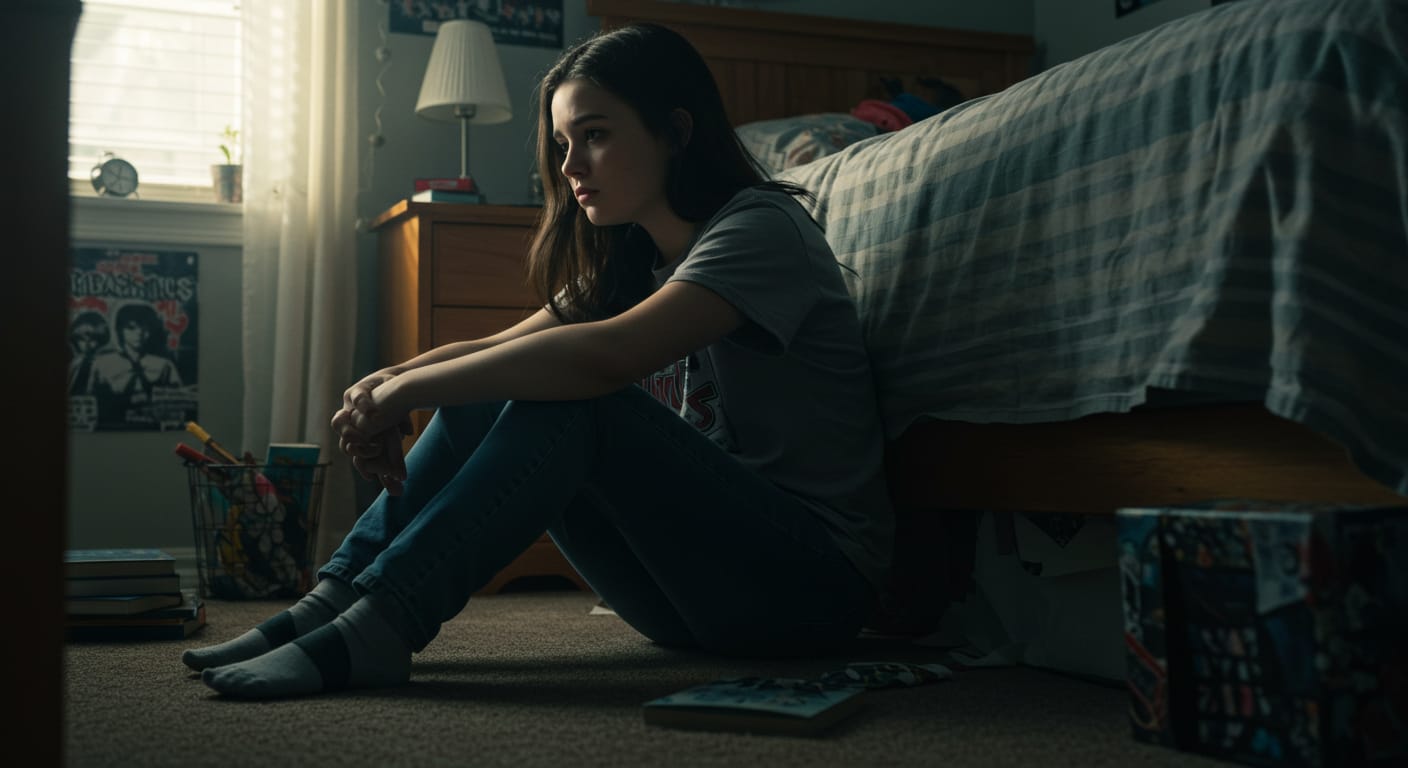Understanding Depression in Teenage Girls
Child development and the hormonal changes that come with puberty can be challenging for many parents to navigate. It’s often painful to watch your daughter struggle with mood swings or sadness and not know how to help. That’s why it’s crucial to understand the difference between normal developmental changes and teenage depression—so you can recognize what’s healthy behavior and what might be a sign that something more serious is going on.
“The sudden surge of hormones at teenage age will continue to play an important part in the life of young people.” — Oche Otorkpa
The Link Between Development and Depression
Puberty can feel overwhelming for teenage girls. As their bodies begin to change, hormone levels fluctuate dramatically to support the onset of menstruation and other physical developments. This period of rapid physical, emotional, and cognitive growth can be both confusing and frightening, making girls more vulnerable to depression.
How Development and Depression Affect Mood
While mood swings are a typical part of adolescence, it’s important to understand when they might be signaling something more serious. Hormonal imbalances during puberty can intensify feelings of sadness, irritability, or hopelessness—common symptoms of depression. Because these changes happen quickly, many teens are caught off guard and struggle to cope.
Early Signs of Teenage Depression
Although moodiness can be normal, ongoing behavioral changes might indicate depression. Be on the lookout for:
-
Withdrawal from friends or activities they once enjoyed
-
Ongoing sadness or irritability
-
Changes in eating or sleeping habits
-
Drop in academic performance
-
Loss of energy or motivation
Teen depression is a real and serious condition. One key factor is that hormonal shifts can disrupt the brain’s emotional regulation, leading to overwhelming feelings that teens are often ill-equipped to handle alone.
How to Tell the Difference
It can be difficult to distinguish between normal adolescent behavior and depression. The most telling difference is that depression doesn’t go away on its own.
According to the Substance Abuse and Mental Health Services Administration, girls aged 12 to 15 are three times more likely to experience depression than boys. That statistic should serve as a wake-up call to parents: your daughter needs your awareness, compassion, and open communication.
Taking Action: Supporting Your Teen
If you suspect your daughter is experiencing more than just typical development, don’t wait. Talk to her, let her know she’s not alone, and seek professional help if needed. Early intervention can make a huge difference—protecting not only her mental health but her academic and social wellbeing.



A parent knows their child best and it is great to get them help as soon as you notice anything might be wrong.
My daughter is a THREEnager…I can only imagine what it is going to be like when she is a teenager. Being a teen is hard enough but I can’t fathom adding on depression on top of that. I think peer pressure and just every day life is very hard on teens and they really need great support systems. Thanks for sharing! Christine, The Choosy Mommy.
Christine The choosy Mommy, You have a lot of time before puberty, middle school and hopefully not teenage depression. Enjoy your 3 year old.
My daughter will be turning 12 this year, and she has quite a bit of anxiety already – so I hope we don’t have any other issues that might pop up this year.
tiaras & tantrums, Your daughter will be fine. There are lots of information online for parents to read but most important your daughter Primary Doctor has a lot of resource and knowledge that you can utilize.
This is important information for anyone with teenage girls!! Its hard to deal with the rush of hormones and the other catty girls!!
This is a helpful post. I don’t have a child yet but for sure, the things you mentioned here are worthy to note of. We’ve all been through our teenage years and we know how hard it can be — how much more so for those who are depressed.
Teenage girls have to go through some difficult changes so it is important to provide them with the guidance and support they need. Thanks for sharing.
This is a very informative article. One extra thing I remember reading that is related is that the human brain in not nearly finished developing when the individual is a teen. So utilizing these tips along with having some faith to weather through current challenges until the individual grows up may “grow” the mind past the depression.
Seattle Travel Blogger, Thanks for new information and your support for teenage depression.
There was a time not too long ago when my middle daughter was depressed. I noticed the difference in her. She is not a teenager though and she was going through a major life change. I found help for her though. She went and talked to a therapist once a week. She is doing much better now.
Jennifer Clay, Glad that you were aware of the signs of teenage depression and was able to get help for your daughter.
This is scary, though I don’t remember feeling like this when I was that age. Parents, moms especially, need to walk through their girls with puberty to avoid this.
This is really interesting. I never thought about how large of an effect regular teenage hormones could have on them.
This is a very nice article. Most parents think it’s just a phase because teens are undergoing a lot of stress, from growing up, school and from friends. We have to learn how to distinguish depression from just the regular teen angst.
Thank you for raising awareness. Teenage depression is indeed a serious thing to address and we should be able to see the tell-tale signs in its early stage.
I have been diagnosed with clinical depression. I do feel my daughter has it as well. It is easy to miss the symptoms if you don’t know what to look for, or if you are not paying attention. However, if you know what to look for, it can be caught and treated early.
Dawn McAlexander, You are correct some Parent do not know what the symptoms are and depression can be miss by thinking it’s an unruly growing phase their child is going through.
Great info. We got teenage girls in the family and your words truly helps us , parents, help them.
I’ve never thought that teenage could be suffering depression, this is interesting. Thanks for sharing.
Middle school is such a hard age for everyone. I think getting the kids involved in sports is a great way for them to feel healthy.
Kristen, Sport is form of exercise and this can help to a degree but if your child is sad with depressing thoughts you may need to evaluate further.
Wow, this is such great advice. I think too many just chalk these changes up to hormones and overlook that depression may be a real issue. Thanks for shedding light on this and for warning those to keep an eye on their child’s changes.
Teenage depression is so real. I try to ensure my son is feeling good about himself at all time. The slightest thing can seem big to them.
Great information! my daughter is 18 but I can still use this info with her. thank you!
Great information, my daughter is only 3 so I have some time to get ready. I have anxiety at the thought of her getting to this stage in life.
I don’t have kids, but this is good information.
One of my closes friends suffered from teenage depression that carried over into her adult life. She sought help and became a clinical social worker who helps teens and adults through depression. I am glad to see others writing about teens and mental health. Great information!
Shawana, Its possible good for your friend now a clinical social worker!
GREAT Post. It’s so important to pay attention to your kids and notice if/when there is a change and how to get help. A friend of mine’s neighbor committed suicide recently and it’s so sad to hear those types of stories.
Joanna, It is distressing to hear about suicide especially when it’s a youngster. But the story must be told…Hopefully more people will become aware and suicide can be prevented.
This article was very informative. My step-daugther is 19 now, but I remember those hormonal changes she experienced.
I don’t have any children, but this is a great post full of helpful information.
I remember my days as a teenager, fortunately I had good people around me to mentor me through and older cousins who served as positive role models.
Hey Patrice, once again very informative. The take away for me this time was the difference between a change in behavior due to hormones or depression and how to distinquish between the two. Thanks!
Great information and while my daughter is 21, grown and on her own, we definitely had some serious hormonal issues when she was a teen. And depression is such a serious thing and comes to different people in different ways, so it’s really important to know as much as possible about it.
Jaye@Curvatude, Your daughter made it great ….Depression hit us at different stages of our lives. But is especially harder on growing teenagers.
Great information and while my daughter is 21, grown and on her own, we definitely had some serious hormonal issues when she was a teen. And depression is such a serious thing and comes to different people in different ways, so it’s really important to know as much as possible about it.